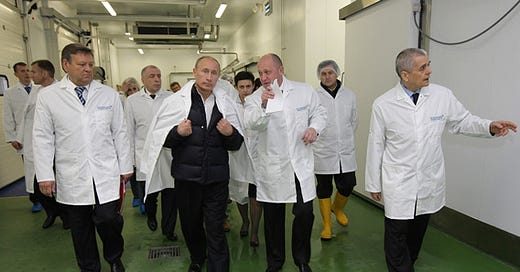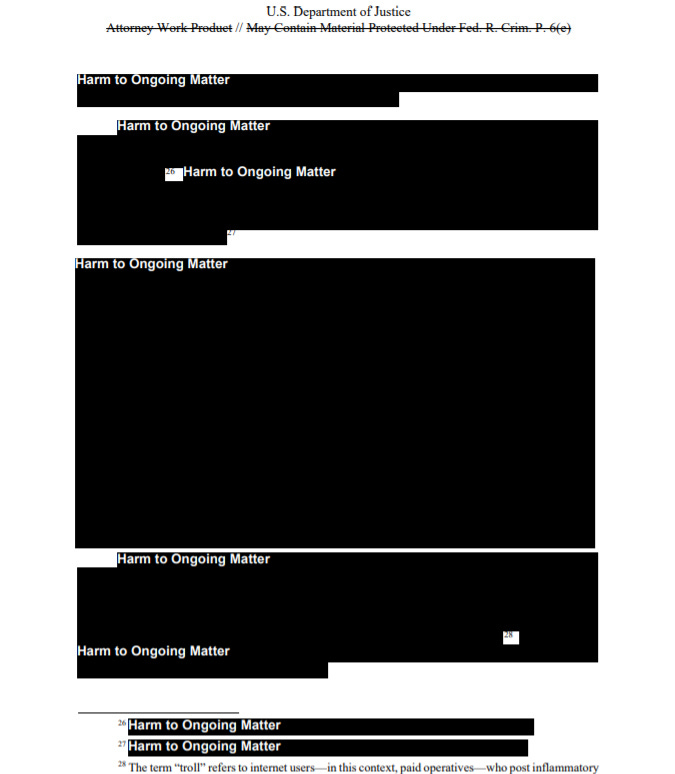Did Michael Cohen, Donald Trump’s personal attorney, meet with Kremlin operatives in Prague in the summer of 2016, like it says in the so-called Steele dossier?
Five years on, we still aren’t sure. Cohen has repeatedly denied the allegation—under oath, which is not the same as spewing lies on TV. A team of reporters from McClatchy, Greg Gordon and Peter Stone, found evidence to support the claim, independent of the dossier. And this week, in his first public appearance since BuzzFeed released his intelligence reports in January 2016, Christopher Steele doubled down. “I’m prepared to accept that not everything in the dossier is 100 percent accurate,” Steele told CNN. “I have yet to be convinced that that”—the Cohen-Prague entry—“is one of them.”
When asked why Cohen, who has dropped so many truth bombs, would continue to lie about Prague, Steele said: “He might be scared of the consequences.”
In other words, it’s one thing to bring the receipts on a hush-money payment to a porn star, implicating Trump; quite another to rat out the Russians, implicating much more sinister forces. Michael Cohen would not have to be told this twice. While he is happy to opine on any number of Trump-related topics—and good on him for that—when the subject changes to, say, his uncle’s ownership of Brooklyn’s El Caribe Country Club—base of operations for the criminal enterprise of notorious Russian mobsters Evsei Agron and Marat Balagula all through the 70s and 80s—or his connections to other shady characters, Cohen is less glib.
To me, the Prague story is plausible because Michael Cohen would have been exactly the right person to dispatch to the Czech capital on such an assignment. He was a trusted associate, a loyal Trump insider, someone willing to say anything to defend the boss—and even skirt the law in his master’s service, as we have seen with the Stormy Daniels imbroglio. He was also, simultaneously, an outsider—not officially connected with the campaign, not a candidate for a job with the incoming administration. And, most importantly, he knew how to follow orders without being given orders. As Cohen said in his testimony before Congress, Trump “doesn’t give you questions; he doesn’t give you orders; he speaks in a code. And I understand the code, because I’ve been around him for a decade.”
If such a meeting took place, Cohen would have been an independent contractor—close to Trump but also removed. It’s the same sort of best-of-both-worlds relationship Vladimir Putin has made use of so effectively.
The Russian ex-con Yevgeniy Viktorovich Prigozhin is known as “Putin’s Chef” or “Putin’s Cook,” because he amassed his billions catering for Putin and his inner circle. He’s also called that because, unlike most people in that inner circle, he does not have an official government job. There’s no other title to use.
As Luke Harding explains in Shadow State: Murder, Mayhem, and Russia’s Remaking of the West, “Putin’s trusted associates fell into two categories, loosely speaking. The largest group was Chekists—former spies. The other was made up of thugs and Mafia types. Prigozhin was never a Chekist. His time in jail and alleged underworld connections put him firmly in the second, gangster camp.”
Putin’s Chef was not just Putin’s Gangster. He was also Putin’s Fixer. He was given the dirty work, the assignments where the boss needed some remove.
It was Prigozhin, not anyone in the Russian government, who funded the generically-named Internet Research Agency, or IRA—the outfit that ran the St. Petersburg troll farms that fucked with the 2016 U.S. presidential election. According to the Mueller Report, Prigozhin’s companies, Concord Management & Consulting LLC and Concord Catering, funneled cash to the IRA—and lots of it. “The IRA’s budget for its [U.S. election sabotage] operation was $1.25 million, or 73 million rubles, a month,” Harding writes, “concealed as payments for software support and development. It included 1 million rubles in bonuses for troll staff.”
Of the “13 Russians” indicted by the Office of the Special Counsel in February 2018, 12 worked for the IRA. The thirteenth was Prigozhin. According to the indictment, “From in or around 2014 to the present, Defendants knowingly and intentionally conspired with each other (and with persons known and unknown to the Grand Jury) to defraud the United States by impairing, obstructing, and defeating the lawful functions of the government through fraud and deceit for the purpose of interfering with the U.S. political and electoral processes, including the presidential election of 2016.” This operation was called Project Lakhta.
The section of the Mueller Report on Prigozhin is heavily redacted, with “harm to ongoing matter” in white type over big black boxes. Here is a sample page:
What was novel about all this was not Lakhta itself. Russians fuck with stuff; they’ve been fucking with stuff in the U.S. for over a century. What was novel was, as Harding explains, “the outsourcing of a strategic intelligence task to a private company.”
The added layer provided for plausible deniability. Putin was able to appear at the Helsinki summit and, with a straight (albeit botoxed) face, point out that “the company is being accused of interference, but this company does not constitute the Russian state.” And Donald Trump was able to take the liar at his word. Never mind that there is zero chance that Putin was not aware of Project Lakhta. As Harding put it, “Putin’s insistence on Prigozhin’s separateness was formally true but actually false.”
Real or imagined, that separateness made Lakhta all the more effective. The IRA was a rogue operator, free to do as it pleased, to adapt to the changing environment without the burden of having its every move signed off on by some functionary in Moscow. “One reason Kremlin messaging is agile is that it uses outside contractors,” Thomas Kent explains in Striking Back: Overt and Covert Options to Combat Russian Disinformation. “The Internet Research Agency is not a government organization but an enterprise of Yevgeny Prigozhin, ‘Putin’s chef’ and a major government contractor.”
Yes, the Chef’s trolls got made by Mueller, but so what? By 2018, the operation had already succeeded in its primary mission of denying Hillary Clinton the White House. By the time the battleship turned around, the speedboats had already made off with the jewels. In the Information Age, lack of quickness leaves us susceptible to further attacks. As Kent explains:
Government also are not adept at the quick, nimble social media and web campaigns needed to fight disinformation today. Political messaging is not longer a matter mainly for press conferences and newspapers. . . . Today’s information wars leap in seconds from news apps to podcasts to social networks to video games. Veronika Špalková of the European Values Center in Prague estimates that a response to disinformation must come within two hours to have a chance of eliminating a false narrative.
The federal government is mighty, but it is slow. In information warfare as in basketball, the way to beat the lumbering giant is with speed.
The United States also outsources work, of course. Halliburton was an independent contractor. Blackwater was an independent contractor. But Trump has put a new twist on it. As President, and now as Former Guy, he has his own Yevgeniy Viktorovich Prigozhins. Remember when Trump became president, he wanted to keep his own security team, and not use the Secret Service? That raised eyebrows at the time, and now seems like an obvious crook move. Michael Cohen was the best of Trump’s rogue operators, but there are plenty of others: Keith Schiller, Matthew Calamari, and so on.
While Trump was obviously involved with January 6—he gave a speech that day, after all, in which he directed his followers to march to the Capitol—the planning and implementation appears to have been outsourced to his allies outside the government. Mike Flynn and Roger Stone (who had been pardoned by Trump in December), and Steve Bannon (who would be pardoned by Trump a few weeks after January 6), were almost certainly among the architects of the insurrection. But if Trump ever appears in court to testify about his role in J-6, he will just channel Putin in Helsinki: “These men are accused of seditious conspiracy, but these men were not part of my campaign.”
In a rebuttal to the Steele interview, Cohen reverted back to his old Trump-bulldog voice: “I eagerly await his next secret dossier which proves the existence of Bigfoot, the Loch Ness Monster and that Elvis is still alive.”
I understand the desire to punch back, but he misses the larger point, which is: our democracy remains under attack.
As Steele told CNN: “The problems we identified back in 2016 haven’t gone away, and arguably have actually got worse, and I thought it was important to come and set the record straight.”
Like Cohen, Putin’s Chef was indicted. Unlike Cohen, he remains at large.
Photo credit: Russian Federation. Prime Minister Vladimir Putin tours the new factory Concord, which supplies pre-prepared meals to schools, 2010. Prigozhin is next to him.






Do you think that too many Democrats & Independents & Others-Who-Would-Never-Vote-For-Trump feel overwhelmed by all the politics, so that many who we need to vote & elect Democrats in the mid-terms won’t turn out? I feel the media makes getting the Administration’s message out to the public much harder than it should be. I feel it still pays way too much attention to Trump & his antics. I guess so-called reality TV & lies sell better than facts & policies. Your article today should be on the front page, reminding readers of the danger the TFG & the GQP présent to our Republic. Instead we hear that Colin Powell died from complications of COVID, complications such as cancer of the blood & Parkinson’s, which we find out if we read far enough into it. I will vote, of course, & I read informative articles such as yours, but quite honestly, I’m tired of the graft & greed & corruption in politics.
Fun fact that Spiridon Ivanovich Putin, Vlad’s paternal gf, was chef to both Lenin & Stalin. So, Vlady the lad, was a made man from the get go. Michael Cohen can never admit to going to Prague because, not only would that endanger his life, but also set him up for an espionage charge. (Louise Mensch made a compelling argument pointing out that Cohen was in Prague but I need to reread her theory before discussing…)